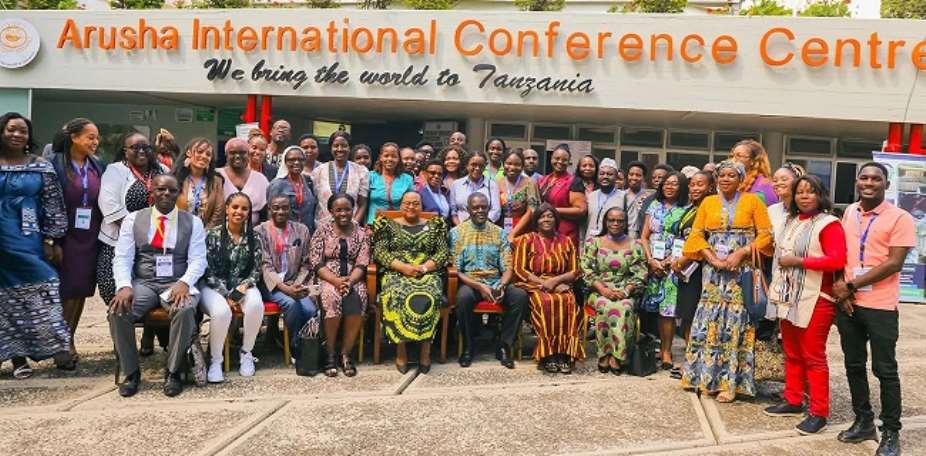The African Institute of International Law (AIIL), based in Tanzania, has trained over 1,242 Africans, of whom 498 are women and 744 are men, in various areas of international law since 2014.
The training focused on areas such as Negotiating International Treaties for African Diplomats, Bilateral Investment Treaties and Arbitration, Dialogue on Human Rights and the African Judiciary, International Law Seminar for African Universities, Reviewing International Reforms to the Investment Regime, and Best Practices in Arbitration in Africa.
The Principle of Permanent Sovereignty over Natural Resources: Hopes and Pitfalls in 21st-Century Africa Confirmation, Negotiation, and Drafting of Bilateral Investment Treaties by African Countries and a workshop on the rights of women in Africa.
Training activities are ongoing, including a long-term programme for accreditation of African arbitrators scheduled to start as soon as possible.
In an interview, Commissioner and Advocate Bahame Tom Nyanduga, a former Member of the African Commission on Human and Peoples’ Rights and the current AIIL Vice Rector responsible for Administration, Capacity Building, and Cooperation, described AIIL as a unique institution engaged in capacity building for the dissemination of international law in Africa.
It also focuses on the law of the African Union and the promotion of the rule of law on the African continent through its training and teaching activities.
He said the institute also organises capacity-building for a network of associated faculties of law in selected African universities by enabling them to strengthen their research facilities and teaching capabilities in the field of international law.
He said the Institute is dedicated to reinforcing the rule of law both domestically and internationally through the effective national implementation of international standards in key areas such as human rights, good governance, independence of the judiciary, accountability, and the fight against corruption.
Commissioner Nyanduga said the African Institute of International Law, in addition to signing a MOU with scores of African universities, is currently in the process of seeking accreditation from the African Union as an AU-specialised agency.
He said the institute also serves as a think tank on international legal issues of particular relevance to the pursuit of closer economic and political integration and the peaceful settlement of disputes in Africa.
The AIIL Vice Rector stated that the Institute has also signed memoranda of understanding to establish cooperation with the African Union Commission, the African Legal Support Facility, the African Court of Human and Peoples’ Rights, the Geneva Centre for Human Rights and Global Dialogue, and the Development and Rule of Law Programme.
Others include Stellenbosch University, South Africa, and the United Nations Economic Commission for Africa—African Institute of Economic Development.
It is to be noted that the memoranda of understanding has been utilised to create cooperation with some of the entities to conduct training programmes with the Institute.
Commissioner Nyanduga also explained that the institute's governance structure includes a governing board whose chairpersons include eminent African and foreign jurists, such as Judge Abdulqawi Yusuf of the International Court of Justice and its former President, Ambassador Amina Mohamed, and former Cabinet Secretary for Foreign Affairs and Education of Kenya, and Judge Fatsah Ouguergouz, former Judge of the African Court of Human and Peoples’ Rights, who is also the Rector.
The Administrative Committee includes eminent judges, African and foreign, such as Judge Mohamed Chande Othman, former Chief Justice of Tanzania; Professor Tchikaya, Judge of the African Court; Judge Vahn Jensen; and Judge William Sekule of the United Nations International Residual Mechanisms of Criminal Tribunals.






 WN/R: Papaase residents kick against alleged plans to mine on River Kantango
WN/R: Papaase residents kick against alleged plans to mine on River Kantango
 OSP cleared Cecilia Dapaah of corruption offence not me – Godfred Dame
OSP cleared Cecilia Dapaah of corruption offence not me – Godfred Dame
 Election 2024: EC to commence replacement of voter ID cards on May 30
Election 2024: EC to commence replacement of voter ID cards on May 30
 Court dismisses interlocutory injunction application against Minerals Commission...
Court dismisses interlocutory injunction application against Minerals Commission...
 NPA to engage Finance Ministry to consider removing taxes on LPG
NPA to engage Finance Ministry to consider removing taxes on LPG
 CDD-Ghana criticises govt handling of Cecilia Dapaah’s money laundering case
CDD-Ghana criticises govt handling of Cecilia Dapaah’s money laundering case
 Medikal explains why he performed with Sister Derby at O2 Indigo concert
Medikal explains why he performed with Sister Derby at O2 Indigo concert
 Ghana will not derail into political turmoil under my watch — Akufo-Addo
Ghana will not derail into political turmoil under my watch — Akufo-Addo
 Namibia's unique desert lions threatened by drought and human conflict
Namibia's unique desert lions threatened by drought and human conflict
 Togo's ruling party wins parliamentary poll in victory for longtime president
Togo's ruling party wins parliamentary poll in victory for longtime president
